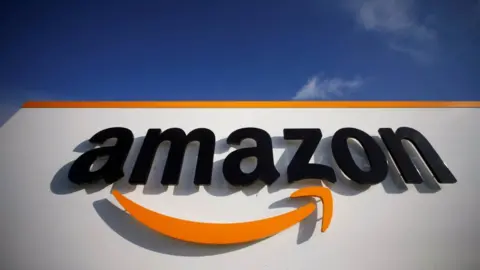Amazon and Google probed over efforts to stop fake reviews
 Getty Images
Getty ImagesAmazon and Google are under investigation over concerns fake five star reviews on their websites could be misleading shoppers.
The Competition and Markets Authority is also worried that "law-abiding businesses" who sell over Amazon and Google may be losing out to firms using false recommendations.
Amazon and Google could face court action for breaking consumer law.
Both firms say they have resources and policies in place to stop fake reviews.
The CMA has launched the formal probe after an initial investigation last year examined whether online companies were doing enough to protect consumers.
Online shopping has soared during the Covid pandemic as retailers deemed as "non-essential" have been forced to close physical shops during periods of lockdown.
"Our worry is that millions of online shoppers could be misled by reading fake reviews and then spending their money based on those recommendations," said CMA chief executive Andrea Coscelli.
"Equally, it's simply not fair if some businesses can fake five-star reviews to give their products or services the most prominence, while law-abiding businesses lose out.
"It's important that these tech platforms take responsibility and we stand ready to take action if we find that they are not doing enough."
'Suspicious patterns of behaviour'
In particular, the CMA is concerned about whether Amazon and Google have been "doing enough" to "detect fake and misleading reviews or suspicious patterns of behaviour".
This includes where the same users "have reviewed the same range of products or businesses at similar times to each other...or where the review suggests that the reviewer has received a payment or other incentive to write a positive review".
The CMA is also examining whether Google and Amazon investigate and remove fake and misleading reviews promptly, as well as looking into what sanctions the companies place on users.
The watchdog said that if it discovered the companies had broken consumer protection law, it could take enforcement action.
This could include securing formal commitments from Amazon and Google to change the way they deal with fake reviews, but it could escalate "to court action if needed".
But it said: "The CMA has not reached a view on whether Amazon and Google have broken the law at this stage."
 Reuters
ReutersThe CMA said it was also concerned that Amazon's systems "have been failing adequately to prevent and deter some sellers from manipulating product listings, for example, by co-opting positive reviews from other products".
A spokesman for Amazon said the company devoted "significant resources to preventing fake or incentivised reviews from appearing in our store".
"We will continue to assist the CMA with its enquiries and we note its confirmation that no findings have been made against our business."
Google said that its policies state "reviews must be based on real experiences" and where it finds violations "we take action" including disabling user accounts.
It said: "We look forward to continuing our work with the CMA to share more on how our industry-leading technology and review teams work to help users find relevant and useful information on Google.''
A report published earlier year this by consumer group Which? discovered an industry that specialises in providing companies with fake reviews in exchange for money or products.
It found that one of these companies had 62,000 reviewers globally and charged sellers on Amazon Marketplace around £13 for a review. It also did bulk deals where a seller could spend £620 for 50 reviews or £8,000 for 1,000 reviews.
Which? said the CMA's investigation was "a positive step".
"The CMA must now move swiftly towards establishing whether these companies have broken the law, said Which? director of policy and advocacy Rocio Concha.
"This should prompt Amazon and Google to finally take the necessary steps to protect users from the growing tide of fake reviews on their platforms and, if they fail to do so, the regulator must be prepared to take strong enforcement action."
